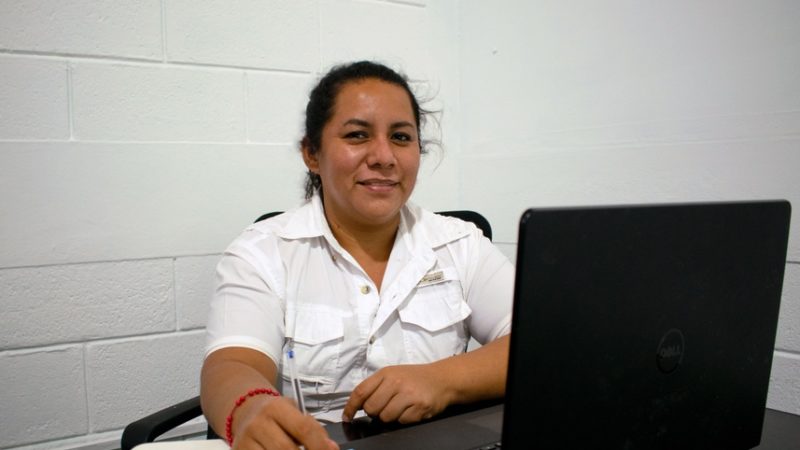
Students gathering in the Guna Yala indigenous province in northeast Panamá. IMAGE CREDIT: Mesoamerican Alliance of Peoples and Forests (AMPB)
Carolina Alvarado, 34 years old, wasn’t always an activist. It was her community that made her into one.
As an adolescent living in the small Mayan village of Uaxactun in Guatemala, she would spend her afternoons with her favorite art teacher. Under this teacher’s guidance, Alvarado and other classmates beautified several buildings in the village: first a church, then a health clinic.
A seemingly small act, it changed how she saw her role in the world.
“I realized then the power of groups. I loved it. I loved seeing the power of a group of people becoming organized,” Alvarado said.

From there, Alvarado’s activism continued to blossom. She joined a regional indigenous rights’ civil association, rising to the rank of secretary by the age of 20 and helping her community win a more expansive land title from the Guatemalan national government in 2000.
And according to Alvarado, it all traces back to her teacher.
So Alvarado was excited to earn the opportunity to teach these same leadership skills herself with the Mesoamerican Leadership School (MLS), a popular educational initiative of the Mesoamerican Alliance of Peoples and Forests (Alianza Mesoamericana de Pueblos y Bosques, or AMPB) launched in 2016.
“It’s such a unique space and experience,” Alvarado says. “I like collaborating with the youth, to help them build towards a better country without losing their sense of identity.”
The MLS has been funded by a range of international donors, and in 2021 began receiving funding from the RFUS-AMPB United States Agency for International Development grant. Rather than a brick-and-mortar institution, the MLS is a series of workshops led by instructors like Alvarado, who travel to indigenous villages across Panama, Honduras, and Guatemala with the aim of advancing indigenous cultural and territorial identity amongst participants.
The education is taught intermittently via four workshops (or “phases”): identity and group empathy; personal and collective identity; community learning and inquiry; and entrepreneurial practice. The program takes three years, and there are approximately 300 students currently enrolled in it—the vast majority of whom are twentysomethings. Together, these youth represent the future of the region’s indigenous rights’ and environmental rights’ movements.
“Although some may not see how leadership training directly correlates to rainforest protection, this kind of pedagogy is essential for the long-term success of a rights-based environmental approach in this part of the world,” explains Josh Lichtenstein, Rainforest Foundation US’s Program Manager.
Workshops allow students who might not have an opportunity to meet, to gather and share ideas. IMAGE CREDIT: AMPB
“Mesoamerica is a place with a historically well-organized indigenous movement,” Lichtenstein says. “But to keep the movement alive and growing, it’s critical to develop leadership skills among the younger generations.”
Meanwhile, with deep poverty a common reality throughout indigenous Mexico and Central America, young people are migrating away from their home communities towards big cities, where their indigenous cultural identity can easily be assimilated and lost.
“If the youth don’t step forward, there’s a chance the movement will not have a future,” Lichtenstein says. “Building territorial leadership starts with raising consciousness around place and identity. And that’s what the Mesoamerican Leadership School is doing. And they’re doing it extremely well.”
Diriam Walker, a Miskito woman from the town of Puerto Lempira on the northeastern coast of Honduras, says she feels privileged by her enrollment in the school, because the education has given her a deeper understanding of what a leader should be, and how she might assume that role in her own community.
“A leader needs to be loving. A leader needs to be respectful,” says Walker, 29 years old. “It’s important to listen. People don’t realize how much listening is a part of leadership,” citing her national government’s clumsy response to the COVID pandemic as just one example of tone-deaf leadership.
And according to Walker, leaders also need to be strong… because outsiders are constantly threatening coastal indigenous communities in Honduras.
“We have a lot of resources. We have valuable forests. There’s gold in our rivers. These people come to take what we have. There is no peace.”
As such, Walker says she drew tremendous inspiration in her formative years from Nacel Kiapa Panting, a Miskito leader from the community of Wampusirpi who died in 2019.
“He had vision,” Walker says. “He said the most important thing is land. He knew before others did that we needed to fight legally for our title. And once we got that paper—thanks to him—we were able to defend our homes.”
Alvarado says that the workshops allow for great exchanges of ideas between indigenous communities who might otherwise not interact, allowing for the emergence of a greater collective wisdom.
“The youth in Uaxactun have so much forest,” Alvarado explains, pointing out that the community is situated in the Maya Biosphere Reserve, a naturally protected region more than 8,000 square miles (2,090,667 hectares)—or slightly larger than the state of Massachusetts.
“But when we went to another community, the cooperative Union Mayaxca, they were trying to figure out what to do with their title. Because they can sell land from their title; they can do whatever they want with it… and what they realized was that the forests were part of their identity. Through the discussion, they came to realize that if you lose or sell your forests, you are losing or selling part of yourself.”
With RFUS and USAID support, the MLS has expanded to new geographies in Mexico, Honduras, and Guatemala, and has begun the design and implementation of new disaster risk management and advocacy methodologies and training modules. The hope is to pilot these modules with these new communities in 2023, hold a regional exchange to share lessons learned and refine teaching tools, which will then be incorporated across the School’s work regionally.
https://www.youtube.com/watch?v=RloB9gemyJg